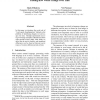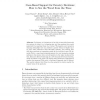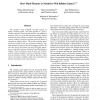26354 search results - page 58 / 5271 » How we refactor, and how we know it |
ACL
2012
11 years 11 months ago
2012
In this paper we introduce the novel task of “word epoch disambiguation,” defined as the problem of identifying changes in word usage over time. Through experiments run using...
ICCBR
2009
Springer
14 years 3 months ago
2009
Springer
In forestry, it is important to be able to accurately determine the volume of timber in a harvesting site and the products that could potentially be produced from that timber. We d...
GLOBECOM
2007
IEEE
14 years 3 months ago
2007
IEEE
Abstract—We explore the performance tradeoff between opportunistic and regulated access inherent in the design of multiuser cognitive radio networks. We consider a cognitive radi...
VTS
2002
IEEE
14 years 1 months ago
2002
IEEE
Run-length codes and their variants have recently been shown to be very effective for compressing system-on-achip (SOC) test data. In this paper, we analyze the Golomb code, the c...
LICS
1997
IEEE
14 years 17 days ago
1997
IEEE
We consider a class of infinite two-player games on finitely coloured graphs. Our main question is: given a winning condition, what is the inherent blow-up (additional memory) of ...



